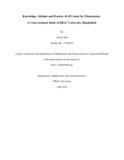Knowledge, Attitude and Practice (KAP) study for thalassemia: a cross-sectional study at BRAC University, Bangladesh
Abstract
Thalassemia is the most common non-communicable autosomal recessive blood disorder posing major public health concerns in many parts of the world including Bangladesh. Having definitive treatments remained largely inaccessible, the approach to reduce the burden is recommended by the prevention through screening. However, the implementation of such preventive measures is still poorly regulated in Bangladesh. So, thalassemia prevention and education are important to disseminate among the targeted youth population as they are the potential future generation of a country. This study aims to investigate the knowledge, attitude and practice (KAP) towards thalassemia among 431 students currently studying at BRAC University. This was a cross-sectional survey conducted from 1 October 2022 to 31 January 2023 to evaluate the participants’ knowledge, attitudes, and practices towards thalassemia using a self-administered questionnaire constructed by Kobo Toolbox. The questionnaire comprised of 39 questions to assess KAP. The Bloom’s cut-off points were interpreted as 80%–100% as good, 60%–79% as moderate and <60% as poor in our KAP assessment. The individual KAP scores on knowledge, attitude and practice showed heterogeneous outcome among the participants with approximately 30%, 50% and 19% good scores, respectively. The association between overall KAP score and different socio-demographic factors showed that being female, engagement in extracurricular activities, having parents as first-generation graduates and their occupation directly linked in health/education sectors demonstrated good KAP scores among the participants in this study. From this study, it can be extrapolated that having good knowledge, better attitude and the best practice towards thalassemia by the young population should genuinely be needed as a significant cultural shift in Bangladesh.

